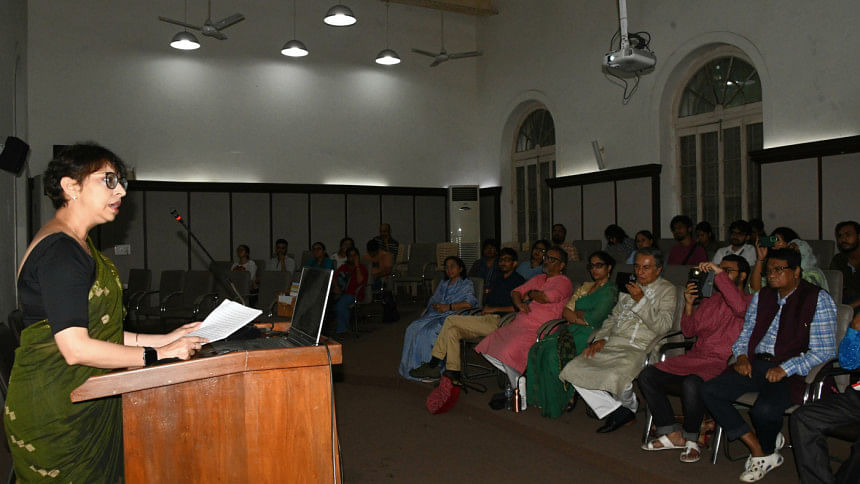'Abul Mansur Ahmad's words still guide us'

The writings of renowned writer, politician, and journalist Abul Mansur Ahmad remain timeless and continue to inspire to this day.
His works on social reform, religious fundamentalism, secularism, democratic values, the Language Movement, Bangladesh's Liberation War, and politics still resonate and guide us.
Professor Rochona Majumdar of the University of Chicago, USA, made the remarks at a special seminar in memory of the noted journalist, political thinker, and writer at Presidency University in Kolkata yesterday.
The event titled "Abul Mansur Ahmad's America: A Global Intellectual History of the Language Movement in East Pakistan/Bangladesh," was held at the university's AK Basak Auditorium.
The event began with a welcome speech by Utpal Chakraborty, associate professor of sociology at the university.
The university's Department of Sociology organised the event.
Professor Majumdar was the keynote speaker at the seminar. She discussed various books written by Abul Mansur Ahmad.
She said, "Abul Mansur Ahmad portrayed the social life, superstitions, politics, and major movements of the subcontinent in a way that remains historically significant and relevant for the future."
He also highlighted, both at home and abroad, the connection between language and nationhood as seen during the founding of the United States, she added.
Prof Majumdar also discussed several of Abul Mansur Ahmad's notable works, including Ayna (Mirror), Food Conference, and Gulliverer Safar (Gulliver's Journey).
She said Ayna and Food Conference addressed issues such as superstition in the Muslim society, while Gulliverer Safar is a satire.
She also touched upon his writings related to language and history in the United States.
Among others, Mahfuz Anam, editor and publisher of The Daily Star and son of Abul Mansur Ahmad, attended the event.
In his concluding remarks, he expressed gratitude to the Presidency University for honouring the legacy of Abul Mansur Ahmad. He later handed over several of Abul Mansur Ahmad's books to the university authorities.
Abul Mansur Ahmad was a prominent figure in the subcontinent -- an accomplished journalist, politician, lawyer, and writer.
Born on September 3, 1898, in Dhanikhola village of Trishal, Mymensingh, he graduated in law from Ripon College, Kolkata. He began his political career with the Congress Party. He also did politics in close association with Netaji Subhas Chandra Bose.
He was also a pioneer of modern and progressive journalism. He worked for prominent newspapers such as Krishak, Nabajug, Sultan, and Mohammadi and was editor of the Kolkata-based Daily Ittehad from 1946 to 1948.
Abul Mansur Ahmad wrote about the language issue from the early 1940s and contributed to the Language Movement as the editor of the Ittehad.
A very successful politician, Abul Mansur Ahmad played a key role in the formation of the Awami Muslim League. He served as vice-president of the organisation from 1953 to 1958.
Abul Mansur Ahmad was the author of the famous Ekush Dafa (21-point programme) election manifesto of Jukta Front in the 1954 election through which the Muslim League was ousted from power.
The Ekush Dafa was the first comprehensive articulation of the political, economic and cultural demands of the Bangalees of the then eastern part of Pakistan.
He was elected a member of East Bengal Provincial Assembly in that election, and served as health minister in the United Front cabinet under Sher-e-Bangla AK Fazlul Huq. In 1955, he was elected a member of Pakistan Constituent Assembly.
He was the minister for education in the United Front government of East Pakistan in 1956 and the minister for commerce and trade in 1956-1957. After the promulgation of martial law by Ayub Khan in 1958, he was imprisoned and subsequently released in 1962.
He then retired from politics.
Abul Mansur Ahmad was known for his strong stand in favour of regional autonomy of East Pakistan. He also made remarkable contributions to industrialisation of the long neglected East Pakistan.
He always propagated secularism in a manner unparalleled in the forties, fifties and sixties.
Ahmad's publications include great satires like "Aina", "Asmani Purdah", "Gulliverer Safar Nama" and "Food Conference". He also penned insightful works on social and political history of Bengal such as "Bangladesher Culture". He has two autobiographical writings -- "Atma Katha" and "Amar Dekha Rajnitir Panchash Bachar".
He received both the Independence Award and the Ekushey Padak for his contributions.

 For all latest news, follow The Daily Star's Google News channel.
For all latest news, follow The Daily Star's Google News channel. 



Comments